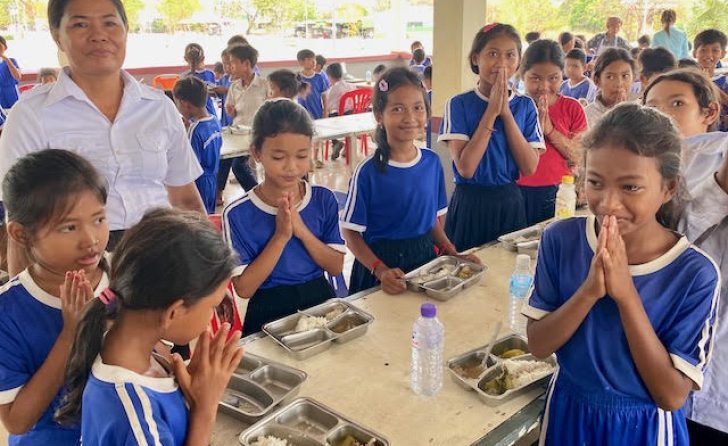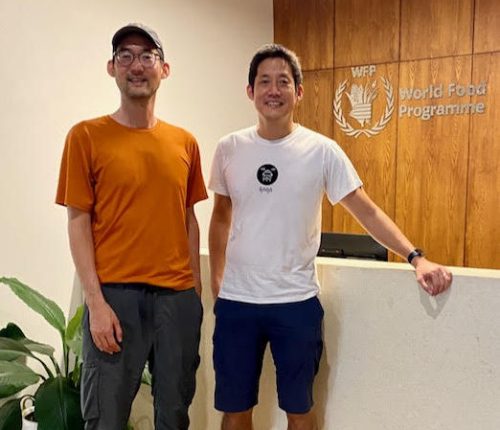Personalism in Action
October 2024
by Fumi
My younger brother, Fumitsugu, who, confusingly, also goes by Fumi, is one of my heroes. He is an amazing father to two beautiful children (plus two beagles), still a triathlete in his mid-forties, and works long hours to end hunger in the world. The U.N. agency where he has worked for over a decade, the World Food Programme, was awarded the Nobel Peace Prize in 2020 for its efforts to combat hunger, promote peace in conflict-affected areas, and prevent the use of hunger as a weapon of war and conflict. WFP delivers emergency food aid to the millions around the world facing severe hunger, often as a result of conflict. They also invest in myriad local initiatives to bolster regional food production and resilience.
The World Food Programme is one of those agencies that restores my faith in institutions. They work to provide immediate relief to those in need, while also tackling the larger, systemic causes of hunger.
I often think about our two lives – my brother’s and mine. As children, I wonder how much he felt over-shadowed by his older brother, as our teachers and coaches called him “Little Fumi” or “Fumi #2.” We share much: the same family, the same roots in Tokyo, the same school whose motto was to educate leaders “prepared for global responsibility,” even the same name. We were both drawn to careers working for a better world – him at the United Nations, me at the Catholic Worker. Yet our daily lives could not be more different – he works in an office, supervising dozens of employees and managing projects, while I work in the kitchen, chopping dozens of onions and managing slow cookers.

Breakfast program supported by WFP
There are days I yearn to make a difference at scale, the way my brother does, eliminating malnutrition, hunger, and poverty for thousands. Yet, I know my calling is different. My calling is to work with the two, three or four individuals we can house at one time at Dandelion House, or the 120 to 160 people who come to us for a hot meal on Fridays. It’s to grow vegetables in a few garden beds, to keep a hive of bees in the backyard, to learn from and care for the various beings in our local watershed.
This is what Catholic Worker co-founders Dorothy Day and Peter Maurin called "Personalism." It's the idea that, because every single person has dignity beyond measure, we are called to personally care for our immediate neighbors.
This is what Catholic Worker co-founders Dorothy Day and Peter Maurin called “Personalism.” It’s the idea that, because every single person has dignity beyond measure, we are called to personally care for our immediate neighbors. My friend and colleague Matt Harper from the Los Angeles Catholic Worker quotes our friend Larry Holben in an excellent article in the Catholic Agitator: “We do not need to wait for systems, governments, social structures, or circumstances to change and make it easier for us, or to bear the burden of the responsibility… We can make a conscious, deliberate choice to bring the kingdom of God into the one particular portion of history which is ours and ours alone to touch.” (Read the full article in the December 2023 Agitator at lacatholicworker.org)

Fumi and Fumi
Of course, we all do this in one way or another, whether we work for the Catholic Worker or the United Nations. In May, I had the chance to visit my brother in Cambodia, where he currently works. As I spoke with his colleagues it was clear to me why he was so successful at his job – it was his gentle personalism, the care with which he listened and related to others, whether colleagues, community partners, or the beneficiaries of WFP’s myriad programs. As we visited an elementary school where WFP had recently built a new cafeteria, my brother, usually a towering figure at 6’3”, became Little Fumi again, conversing in broken Khmer on bended knee with the school children over breakfast. Listening, caring, loving – that was the face of the United Nations for the children at Smet Primary School in Kampong Chnang Province, Cambodia, that morning.
There is work that needs to be done at scale. And always, we must demand that systems and governments work for the advancement of social justice, since, as Matt writes in his article, “for what other purpose do these entities exist?” At the same time, amidst the pressures of a turbulent world, we invite you to seek your center in “the one particular portion of history” which is yours to touch.
